Donald Trump

People need to believe in something, or someone, or Someone.
This human need to believe is a very powerful force. It can overcome a great deal of countervailing evidence. One place this is obvious is in politics.
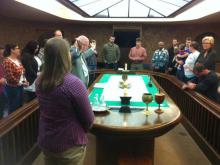
The idea for an Election Day church service came to the pastor as he was pouring juice into little plastic cups.
Mark Schloneger was preparing for Communion that day in 2008, in the kitchen of Waynesboro Mennonite Church in Virginia’s Shenandoah Valley. The phone rang. It was a robocall from Sarah Palin, the GOP’s vice presidential nominee that year. She was imploring Christians to go to the polls, vote for her party, and take back the country.

When Donald Trump looks at Mosul, a city suffocated by ISIS, he sees missed opportunity. On the campaign trail and in debates, he's expressed anger and dismay that military forces announced the operation to liberate Mosul months ahead of time. It should have been a sneak attack, he says over and over.

In the summer of 430, the great Christian writer and bishop Augustine of Hippo lay dying as barbarians besieged his North African city – basically a mop-up operation in the slow-motion fall of the Roman Empire.
Today, in the fall of the year 2016, a lot of Christians can relate.

Halloween has passed and people are still scared out of their minds. The ghoulish costumes, haunted houses, and spirits, just don’t compare to the future of this country set to unfold over the next few days. Separatism, sexual assault, and scandal have set the stage. The anxiety of what is to come is chilling. I see it everywhere.

So I am writing this to you, the pastors and spiritual leaders of congregations of Christians all across America. I am asking about your pastoral and prophetic responsibilities as we approach this historic election with potential consequences that we have never seen before in our lifetimes.

While I was in Germany last week, watching the American election from afar, the Lutheran lectionary called for Micah 6:6-8 as text. That last verse plays a central role in America’s self-perception. It leads back to the year 1630, when a group of pious Calvinists sailed from England to North America. Boxed in between state church and English monarchy, they longed for more space to follow their religion. They wanted to build a society centered on the word of the God of the Bible. The Pilgrims decided to leave Europe and its institutions to become American immigrants. No walls could have stopped them.
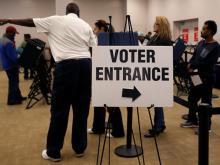
They are many, shift between parties, and typically side with the candidate who ends up winning the White House.
That’s what makes Catholics the ultimate swing voters in the U.S. And this year they are going to throw their weight behind Democrat Hillary Clinton, a panel of political analysts said on Oct. 31.

Hoping for divine intervention – or Jewish votes – Donald Trump wrote a short prayer to be inserted in between the stones of the Western Wall.
Trump’s team photographed and sent a copy of the handwritten prayer to Ynet News and Yedioth Ahronoth, Israeli sister publications. The original was handed to David Faiman, a Trump advisor, who was heading to Israel, the news outlets reported.

May you remember that all politics and all platforms and all legalities and all borders and all leaders are temporary.
May you recall that political movements and boundaries and personalities and programs are here one day and gone the next. All of these are passing away.

In 2013, Francis provoked an outcry from economic conservatives with the release of his apostolic exhortation, “Evangelii Gaudium (The Joy of the Gospel),” which was widely seen as his personal manifesto. In it, Francis said the world could no longer trust “the unseen forces and the invisible hand of the market,” and called for ecclesiastical renewal and compassion for the poor.
Cox, who taught at Harvard for 50 years, dedicated his latest book to the pope because they share a concern about what Francis called a “deified market” that’s creating “new idols.”
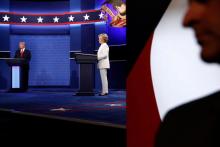
For some, the choice is not clear. Clinton-Kaine may be the more personally religious ticket, but Trump-Pence is more cozy with the religious right, aka the evil empire among atheists. Then there’s Green Party candidate Jill Stein, who has no chance of victory, but is the only candidate who reached out to nonbelievers and asked for their vote.
So what’s an atheist to do?
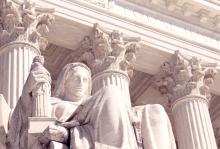
As a Christian who truly believes that abortion is a moral issue, I am deeply committed to dramatically reducing them. But criminalizing an often desperate choice is not the answer. We must also be deeply committed to the economic security, healthcare, and childcare choices that women need, which are critical to reducing abortion. I believe in the sacredness and dignity of life from womb to tomb. But a “consistent ethic of life” also ending poverty, human trafficking, the death penalty, ceaseless and senseless wars, and weapons of mass destruction.

Behind the scenes, for example, the two candidates – who couldn’t bring themselves to shake hands at the third and final presidential debate a night earlier – were brought together by the cardinal during a brief pre-dinner prayer.
“They were both icy from the beginning, you could tell,” Dolan said. “They’re not on each other’s Christmas card list, I can tell you that. You could tell those two had a rather, I’d say, frigid relationship, more than icy.”
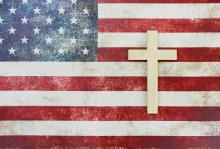
Much ink has been spilled this election cycle on the future of evangelicalism given the “God gulf” between some white evangelical Donald Trump supporters and those evangelicals who have either long denounced Trump’s candidacy or who more recently have decided that some of Trump’s rhetoric and policy proposals have gone too far. But the root of this divide may be found in this fact, released this week by the Public Religion Research Institute: “No group has a dimmer view of American cultural change than white evangelical Protestants.”

The incident seems like a straightforward hate crime: Swastikas sprayed in and around the New Jersey home of an Indian-American running for Congress earlier this month.
But the vandalism is steeped in religious and ethnic irony.
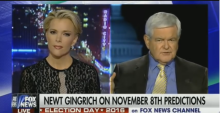
Former Speaker of the House and Donald Trump surrogate Newt Gingrich appeared on Fox News' The Kelly File Tuesday evening to discuss the final campaign push two weeks from Election Day. In a conversation about the debates and state of Trump's campaign, Gingrich quickly accused Kelly of media bias for not giving equal attention to Hillary Clinton's leaked emails and speech in which she mentioned "open borders." But when Kelly pointed out the seriousness of sexual assault allegations, Gingrich went on the attack.
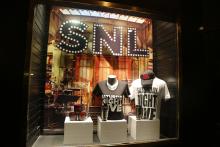
In “Black Jeopardy,” two African-American contestants play a game of "Jeopardy!" with questions geared toward black culture. The third contestant is usually a white person who’s painfully out of touch with the game's subject matter. In the latest installment, two African-American contestants compete against a Trump supporter — easily the most out-of-touch white person they have faced yet. Or so they think.

With Mosul making headlines around the world this week, there are a lot of people tuned in to things here right now.
That said, from our vantage point on the ground and on the front lines of this crisis, there are a few things you might be hearing that aren’t quite right, or don’t tell the whole story — and we want to provide some clarity. They aren’t totally wrong, per se, but they’re off, and we think you deserve to know the full story.

For the first time in three general election debates, a moderator asked the presidential candidates on Oct. 19 about abortion.
Given that abortion has rightly been described as the source of America’s second civil war, there has been a baffling lack of engagement with it this election cycle.